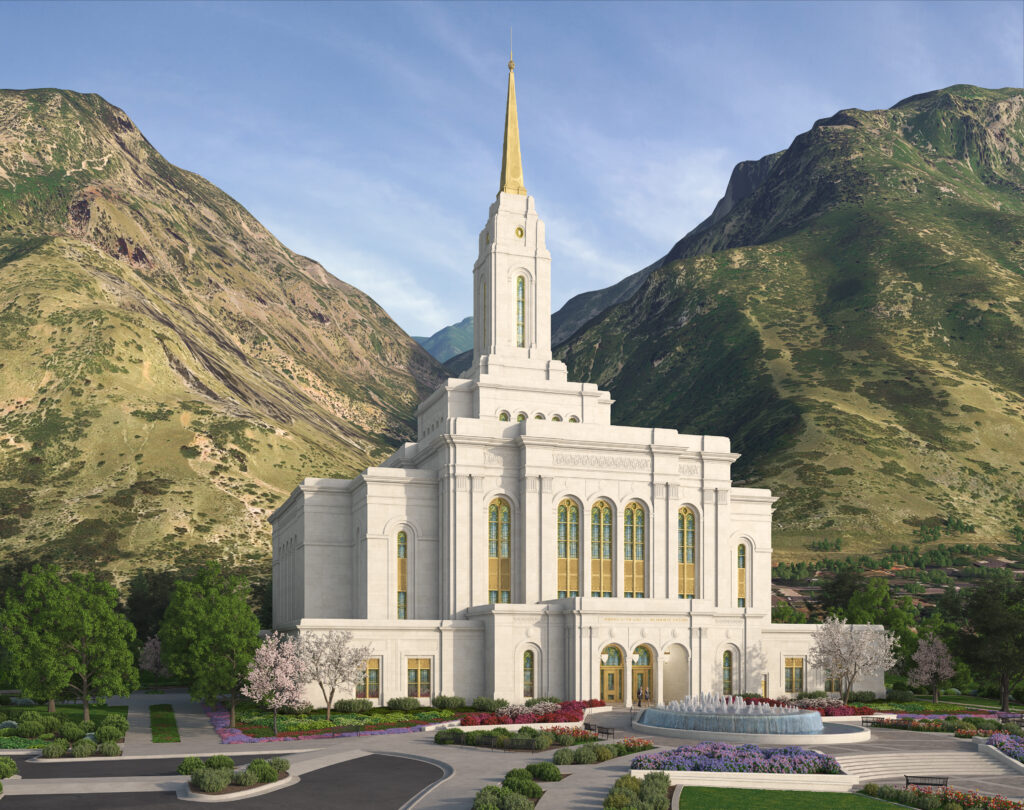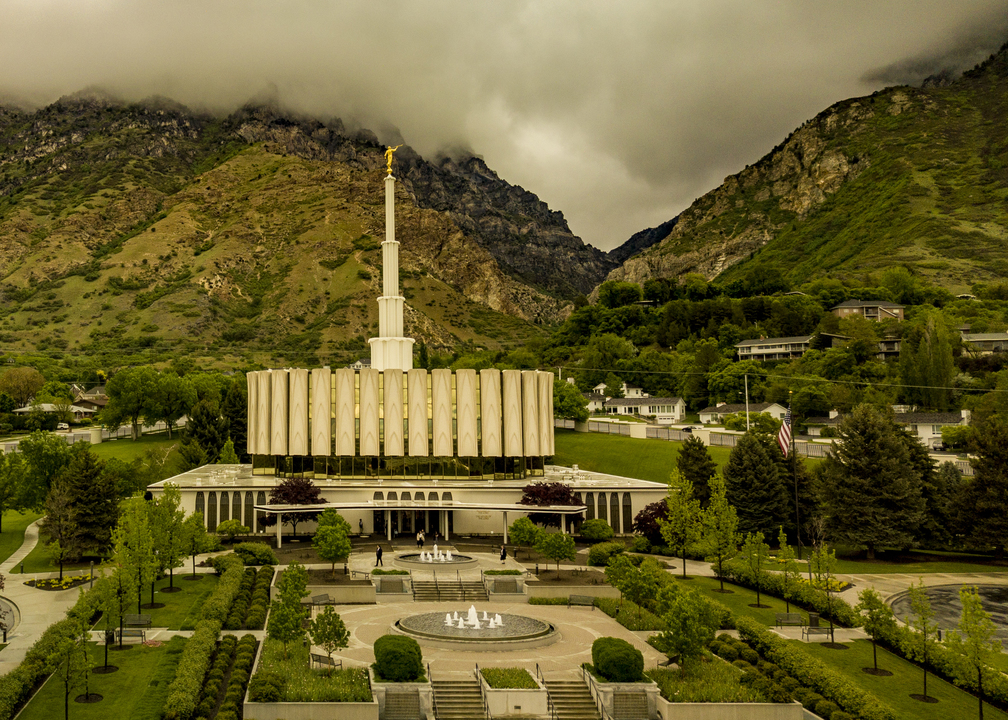Difference between revisions of "Provo Utah Temple"
m (→The Provo Utah Temple Will be Redesigned) |
m |
||
| Line 3: | Line 3: | ||
The Provo Utah Temple is the 15th operating temple of [[The Church of Jesus Christ of Latter-day Saints]]. | The Provo Utah Temple is the 15th operating temple of [[The Church of Jesus Christ of Latter-day Saints]]. | ||
| − | In 1967, an announcement was made that LDS Church would construct another Utah temple in Provo, to help ease the overcrowding of the [[Salt Lake Temple|Salt Lake]], [[Manti Utah Temple|Manti]] and [[Logan Utah Temple|Logan]] temples already in the area. | + | In 1967, an announcement was made that the LDS Church would construct another Utah temple in Provo, to help ease the overcrowding of the [[Salt Lake Temple|Salt Lake]], [[Manti Utah Temple|Manti]], and [[Logan Utah Temple|Logan]] temples already in the area. |
| − | Since | + | Since Provo's early years, a hill just northeast of downtown Provo, was called "Temple Hill." But hopes of a temple being there were cut off when the Maeser Building was built on the hill in 1911 as a part of the [[Brigham Young University]] campus. There was, however, a seventeen acres block of property just at the base of Rock Canyon that was still undeveloped when the temple was announced. This area was easily visible from most parts of Provo and it became the site for the Provo Utah Temple. |
| − | A groundbreaking ceremony was held on September | + | A groundbreaking ceremony was held on 15 September 1969, with President [[Hugh B. Brown]] presiding. The construction of the temple began soon after. The dedication of the temple was held 9 February 1972. The prayer was written by President [[Joseph Fielding Smith]] and read by President [[Harold B. Lee]]. Only two dedicatory services were held because the sessions were broadcast to several large auditoriums on the [[Brigham Young University]] campus as well as the 23,000-seat Marriott Center. |
| − | The Provo | + | The Provo Utah Temple is one of the busiest temples in the world. Much of this is due to the fact that Brigham Young University and the [[Missionary Training Center]] are both included in the [[Temple district|temple's district]]. The temple has led the Church in total number of [[Endowment Mormon|endowments]] performed every year since its construction, without counting those done by the [[Missionaries|missionaries]] from the [[Missionary Training Center]] and [[Brigham Young University]] students. |
| − | Emil B. Fetzer, the architect for the Ogden and Provo temples, had been asked to create a functional design. Efficiency, convenience, and reasonable cost were all factors. The temple has 128,325 square feet, and 12 [[Celestial marriage|sealing rooms]]. A [[Ordinances|six-ordinance room]] design was approved. An outside hallway surrounds these rooms, and all connect to the Celestial Room in the center. The design is very modern with a single spire. Thirty one years after the temples completion, the [[angel Moroni]] was added to the | + | Emil B. Fetzer, the architect for the [[Ogden Utah Temple|Ogden]] and Provo temples, had been asked to create a functional design. Efficiency, convenience, and reasonable cost were all factors. The temple has 128,325 square feet, and 12 [[Celestial marriage|sealing rooms]]. A [[Ordinances|six-ordinance room]] design was approved. An outside hallway surrounds these rooms, and all connect to the Celestial Room in the center. The design is very modern with a single spire. Thirty one years after the temples completion, the [[Angel Moroni|angel Moroni]] statue was added to the temple's spire. |
| + | |||
| + | __FORCETOC__ | ||
==The Provo Utah Temple Will be Redesigned== | ==The Provo Utah Temple Will be Redesigned== | ||
Revision as of 12:07, 25 November 2021
The Provo Utah Temple is the 15th operating temple of The Church of Jesus Christ of Latter-day Saints.
In 1967, an announcement was made that the LDS Church would construct another Utah temple in Provo, to help ease the overcrowding of the Salt Lake, Manti, and Logan temples already in the area.
Since Provo's early years, a hill just northeast of downtown Provo, was called "Temple Hill." But hopes of a temple being there were cut off when the Maeser Building was built on the hill in 1911 as a part of the Brigham Young University campus. There was, however, a seventeen acres block of property just at the base of Rock Canyon that was still undeveloped when the temple was announced. This area was easily visible from most parts of Provo and it became the site for the Provo Utah Temple.
A groundbreaking ceremony was held on 15 September 1969, with President Hugh B. Brown presiding. The construction of the temple began soon after. The dedication of the temple was held 9 February 1972. The prayer was written by President Joseph Fielding Smith and read by President Harold B. Lee. Only two dedicatory services were held because the sessions were broadcast to several large auditoriums on the Brigham Young University campus as well as the 23,000-seat Marriott Center.
The Provo Utah Temple is one of the busiest temples in the world. Much of this is due to the fact that Brigham Young University and the Missionary Training Center are both included in the temple's district. The temple has led the Church in total number of endowments performed every year since its construction, without counting those done by the missionaries from the Missionary Training Center and Brigham Young University students.
Emil B. Fetzer, the architect for the Ogden and Provo temples, had been asked to create a functional design. Efficiency, convenience, and reasonable cost were all factors. The temple has 128,325 square feet, and 12 sealing rooms. A six-ordinance room design was approved. An outside hallway surrounds these rooms, and all connect to the Celestial Room in the center. The design is very modern with a single spire. Thirty one years after the temples completion, the angel Moroni statue was added to the temple's spire.
The Provo Utah Temple Will be Redesigned

Just shy of its 50-year-mark, the planned reconstruction of the Provo Utah Temple as announced during the 191st semiannual general conference of The Church of Jesus Christ of Latter-day Saints in October 2021, by President Russell M. Nelson, will result in a major redesign and exterior overhaul to the temple. President Nelson also mentioned that the reconstruction of the Provo Utah Temple will begin after the Orem Utah Temple is dedicated.
The Church released the exterior rendering of the redesigned Provo Utah Temple on Wednesday, 24 November 2021. The changes that will be made to the temple are similar to those several years ago of its sister sacred edifice, the Ogden Utah Temple, which underwent a major renovation and architectural change unlike any other temple of the Church.
The location of the Provo Utah Temple will remain the same — at the mouth of Rock Canyon on Provo's east bench, overlooking the Provo Missionary Training Center, the Brigham Young University campus, the Provo-Orem area, and Utah Lake. Closure dates will be announced at a later time.
By the time the Provo temple is closed for renovations, Utah Valley will be home to six dedicated temples — the Orem, Provo City Center, Payson, Mount Timpanogos, Provo, and Saratoga Springs temples. The latter is currently under construction, having started 11 months prior to the construction of the Orem Utah Temple, and will likely be finished and dedicated well before the Orem Utah Temple. A seventh temple has been announced for Lindon, Utah, north of Orem, and is in the planning and design stages.
In addition to the extensive overall exterior redesign, the renovated Provo temple will be without an angel Moroni statue. Originally built without, the temple had its current angel Moroni statue added atop the spire in 2003, three decades after the temple was dedicated.
External links
Temples in Utah
- Bountiful Utah Temple
- Brigham City Utah Temple
- Cedar City Utah Temple
- Deseret Peak Utah Temple
- Draper Utah Temple
- Ephraim Utah Temple
- Heber Valley Utah Temple
- Jordan River Utah Temple
- Layton Utah Temple
- Lehi Utah Temple
- Lindon Utah Temple
- Logan Utah Temple
- Manti Utah Temple
- Monticello Utah Temple
- Mount Timpanogos Utah Temple
- Ogden Utah Temple
- Oquirrh Mountain Utah Temple
- Orem Utah Temple
- Payson Utah Temple
- Provo City Center Temple
- Provo Utah Rock Canyon Temple
- Red Cliffs Utah Temple
- Salt Lake Temple
- Saratoga Springs Utah Temple
- Smithfield Utah Temple
- St. George Utah Temple
- Syracuse Utah Temple
- Taylorsville Utah Temple
- Vernal Utah Temple
- West Jordan Utah Temple
